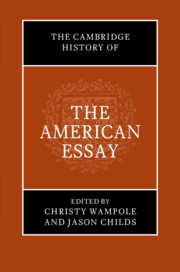Book contents
- The Cambridge History of the American Essay
- The Cambridge History of the American Essay
- Copyright page
- Contents
- Acknowledgments
- Notes on Contributors
- Introduction
- Part I The Emergence of the American Essay (1710–1865)
- 1 Essays to Do Good: Puritanism and the Birth of the American Essay
- 2 Prattlers, Meddlers, Bachelors, Busy-Bodies: The Periodical Essay in the Eighteenth Century
- 3 The Federalist and the Founders
- 4 American Nature Writing: 1700–1900
- 5 The Essay and Transcendentalism
- 6 Old World Shadows in the New: Europe and the Nineteenth-Century American Essay
- 7 Poet-Essayists and Magazine Culture in the Nineteenth Century
- 8 Antebellum Women Essayists
- Part II Voicing the American Experiment (1865–1945)
- Part III Postwar Essays and Essayism (1945–2000)
- Part IV Toward the Contemporary American Essay (2000–2020)
- Recommendations for Further Reading
- Index
2 - Prattlers, Meddlers, Bachelors, Busy-Bodies: The Periodical Essay in the Eighteenth Century
from Part I - The Emergence of the American Essay (1710–1865)
Published online by Cambridge University Press: 28 March 2024
- The Cambridge History of the American Essay
- The Cambridge History of the American Essay
- Copyright page
- Contents
- Acknowledgments
- Notes on Contributors
- Introduction
- Part I The Emergence of the American Essay (1710–1865)
- 1 Essays to Do Good: Puritanism and the Birth of the American Essay
- 2 Prattlers, Meddlers, Bachelors, Busy-Bodies: The Periodical Essay in the Eighteenth Century
- 3 The Federalist and the Founders
- 4 American Nature Writing: 1700–1900
- 5 The Essay and Transcendentalism
- 6 Old World Shadows in the New: Europe and the Nineteenth-Century American Essay
- 7 Poet-Essayists and Magazine Culture in the Nineteenth Century
- 8 Antebellum Women Essayists
- Part II Voicing the American Experiment (1865–1945)
- Part III Postwar Essays and Essayism (1945–2000)
- Part IV Toward the Contemporary American Essay (2000–2020)
- Recommendations for Further Reading
- Index
Summary
The chapter shows the outsize influence of the British periodical essay tradition, represented in publications like Addison and Steele’s Spectator (1711– 12), on eighteenth-century American periodical essays. The British series presented themselves as the musings of fictional personae who lived in cities. The persona (almost always male) wandered about town, reflecting on what he observed and overheard in coffeehouses, streets, theaters, and other places of business or leisure. He was often diverted and sometimes frustrated by his fellow citizens; he also strived to enlighten with casual criticism of the arts or musings on the relevance of religion and history to everyday life. A pervasive, low-level irony was common in these writings. American essayists such as Benjamin Franklin, Washington Irving, and Judith Sargent Murray borrowed from the British model, customizing it for an American readership. The most original early American essay series sketch in their personae a knowing independence of mind amid a distracted and unreflective urban crowd, a rhetorical standpoint that paradoxically would come to define a newly nationalistic body of literature in the nineteenth century.
Keywords
- Type
- Chapter
- Information
- The Cambridge History of the American Essay , pp. 32 - 45Publisher: Cambridge University PressPrint publication year: 2023



